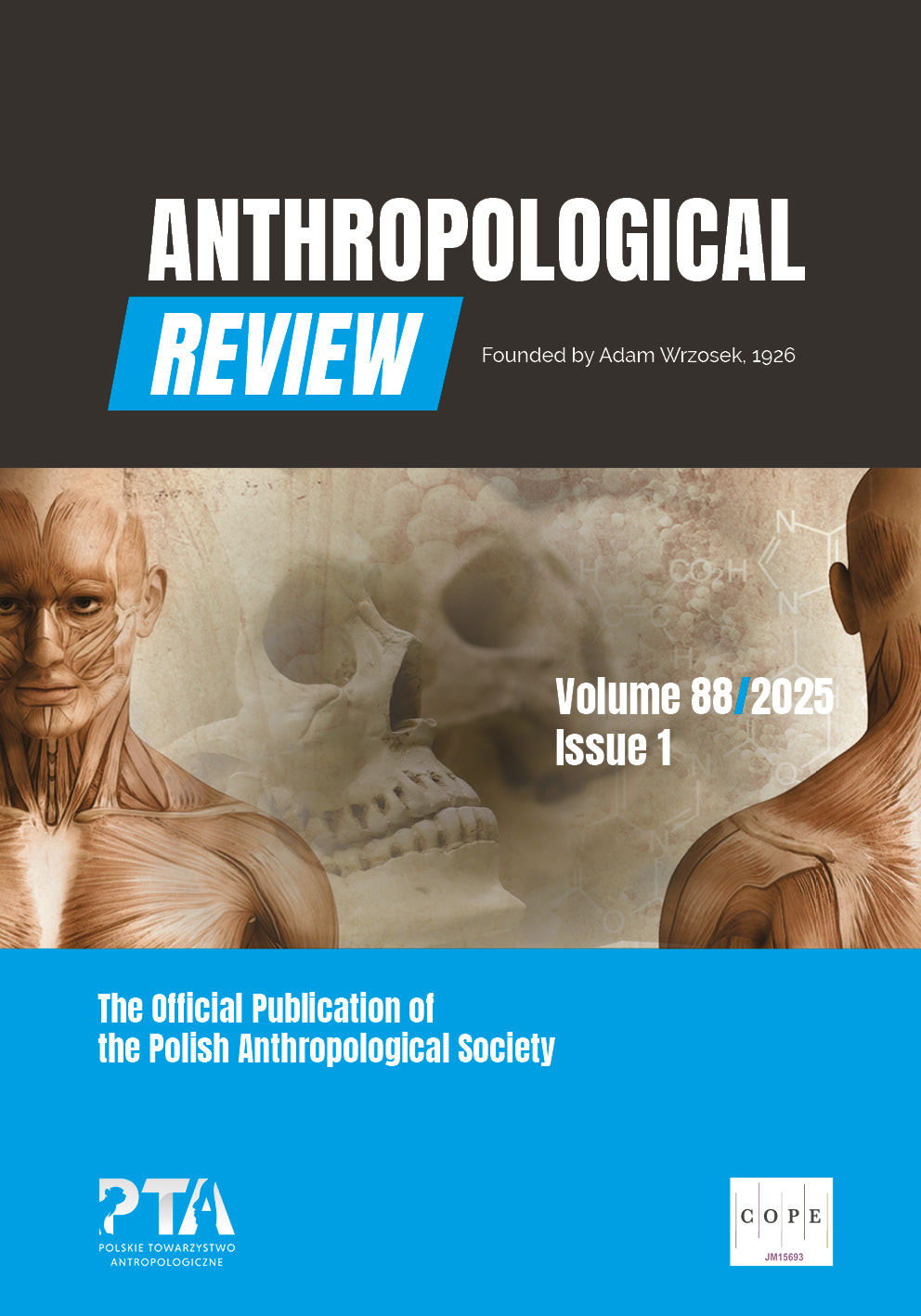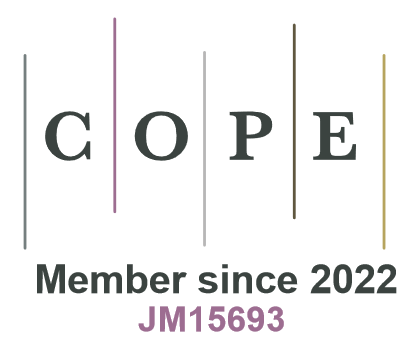A Cross-Sectional Approach in Unveiling the Prevalence, Anthropometric Measurements, and Risk Factors of Eating Disorders among Bengalee Adolescent Females
DOI:
https://doi.org/10.18778/1898-6773.88.1.02Keywords:
BMI-for-age, body dissatisfaction, eating disorder, meal skipping, overweightAbstract
Background: The crucial adolescent period demands greater nutritional needs along with physical maturity where overweight can lead to sensitivity towards body image. Excessive appearance concern results in faulty eating habits and complementary behavioral approaches known as eating disorders (ED).
Aim: Due to inconsistencies in prior information regarding ED on Bengalee adolescent females, the cross-sectional study was conducted on Bengalee school females of rural and urban areas of North 24 Parganas district with the insights of prevalence, anthropometric parameters and risk factors of ED.
Method: The study design consisted of self-reported surveys using standardized questionnaires (Eating disorder examination questionnaire-28; Body shape questionnaire-34) to determine ED, body dissatisfaction (BD), meal skipping (MS) and objective assessments of anthropometric parameters of 396 students aged 13–19 years. Statistical analysis was conducted to interpret the findings.
Result: 14.39% ED and 44.95% BD cases were found in this community with significantly high BMI-for-age (BAZ), hip circumference and subscale values of ED questionnaire among ED participants. After chi-square and binary logistic regression analysis regular MS was found to be the strongest predictor of ED accounting for 14% likelihood of ED followed by fear-of-weight-gain (4.48%) and excessive exercise (3.88%).
Conclusion: The findings highlight a complex interplay of psychological and social factors contributing to ED. Regular MS emerged as the strongest predictor of ED, reflecting an unhealthy coping strategy driven by psychological stressors such as fear of weight gain, excessive exercise and BD. Influence of cultural norms on body image cannot be avoided. Our findings will help healthcare practitioners in designing identification treatment procedures and diet plans in a holistic way during further investigation of ED.
Downloads
References
Ahorsu DK, Imani V, Potenza MN, Chen HP, Lin CY, Pakpour AH. 2023. Mediating roles of psychological distress insomnia and body image concerns in the association between exercise addiction and eating disorders. Psychol Res Behav Manag 31:2533–42. https://doi.org/10.2147/PRBM.S414543
View in Google Scholar
DOI: https://doi.org/10.2147/PRBM.S414543
Alfalahi M, Mahadevan S, Balushi RA, Chan MF, Saadon MA, Al-Adawi S, Qoronfleh MW. 2022. Prevalence of eating disorders and disordered eating in Western Asia: a systematic review and meta-Analysis. Eat Disord 3;30(5):556–85. https://doi.org/10.1080/10640266.2021.1969495
View in Google Scholar
DOI: https://doi.org/10.1080/10640266.2021.1969495
Almutairi R, Azuhairi AA, Mahmud A, Dablool AS. 2023. Eating disorders among adolescent female students in Jeddah Saudi Arabia. Malays J Med Sci 30(1):185. https://doi.org/10.21315/mjms2023.30.1.16
View in Google Scholar
DOI: https://doi.org/10.21315/mjms2023.30.1.16
Babu SS and Aroor AR. 2017. Eating disorder among Indian adolescent. Ind J Youth Adol Health 4(1):11–15. https://doi.org/10.24321/2349.2880.201703
View in Google Scholar
DOI: https://doi.org/10.24321/2349.2880.201703
Bacopoulou F, Efthymiou V, Landis G, Rentoumis A, Chrousos GP. 2015. Waist circumference waist-to-hip ratio and waist-to-height ratio reference percentiles for abdominal obesity among Greek adolescents. BMC Pediatrics 15(1). https://doi.org/10.1186/s12887-015-0366-z
View in Google Scholar
DOI: https://doi.org/10.1186/s12887-015-0366-z
Bauman D. 2023. Impact of obesity on female puberty and pubertal disorders. Best Pract Res Clin Obstet Gynaecol 10:102400. https://doi.org/10.1016/j.bpobgyn.2023.102400
View in Google Scholar
DOI: https://doi.org/10.1016/j.bpobgyn.2023.102400
Bhargava M, Bhargava A, Ghate SD, Rao RSP. 2020. Nutritional status of Indian adolescents (15–19 years) from National Family Health Surveys 3 and 4: Revised estimates using WHO 2007 Growth reference. PLOS ONE 15(9):e0239923. https://doi.org/10.1371/journal.pone.0239923
View in Google Scholar
DOI: https://doi.org/10.1371/journal.pone.0239923
Brief Industrial profile of North 24 Pargana district Ministry of MSME Govt. of India. https://dcmsme.gov.in/old/dips/NORTH%2024-PARGANAS.pdf. Accessed 2.5.2023.
View in Google Scholar
Carter JC, Stewart DA, and Fairburn C. 2001. Eating disorder examination questionnaire: norms for young adolescent girls. Behav Res Ther 39:625–632. https://doi.org/10.1016/s0005-7967(00)00033-4
View in Google Scholar
DOI: https://doi.org/10.1016/S0005-7967(00)00033-4
CDC Physical activity basics. https://www.cdc.gov/physical-activity-basics/measuring/index.html. Accessed Jan 2023.
View in Google Scholar
Chen DR, Lin LY, Levin B. 2023. Differential pathways to disordered eating for immigrant and native adolescents in Taiwan. J Eat Disord 11(1):54. https://doi.org/10.1186/s40337-023-00781-4
View in Google Scholar
DOI: https://doi.org/10.1186/s40337-023-00781-4
Das S. 2016. Textbook of community nutrition. 2nd edition. Academic Publishers. ISBN: 978-93-83420-69-8.
View in Google Scholar
Dikshit R, Karia S, Shah N, Sonavane S, and DeSousa A. 2020. A study on binge eating behavior in urban adolescents. Asian J Psychiatr. 50:101998. https://doi.org/10.1016/j.ajp.2020.101998
View in Google Scholar
DOI: https://doi.org/10.1016/j.ajp.2020.101998
Feng B, Harms J, Chen E, Gao P, Xu P, and He Y. 2023. Current Discoveries and Future Implications of Eating Disorders. Int J Environ Res Public Health 20(14):6325. https://doi.org/10.3390/ijerph20146325
View in Google Scholar
DOI: https://doi.org/10.3390/ijerph20146325
Fernández-Aranda F, Granero R, and Jiménez-Murcia S. 2023. Eating Disorders and Addictive Behaviors: Implications for Human Health. Nutrients 15(17):3718. https://doi.org/10.3390/nu15173718
View in Google Scholar
DOI: https://doi.org/10.3390/nu15173718
Flament MF, Henderson K, Buchholz A, Obeid N, Nguyen HN, Birmingham M, Goldfield G. 2015. Weight status and DSM-5 diagnoses of eating disorders in adolescents from the community. J Am Acad Child Adolesc Psychiatry 54(5):403–11. https://doi.org/10.1016/j.jaac.2015.01.020
View in Google Scholar
DOI: https://doi.org/10.1016/j.jaac.2015.01.020
Ganguly N, Roy S, Mukhopadhyay S. 2018. Association of socio-culture factors with disordered eating behavior: An empirical study on urban young girls of West Bengal India. Anthropol Rev 81(4):364–378. https://doi.org/10.2478/anre-2018-0032
View in Google Scholar
DOI: https://doi.org/10.2478/anre-2018-0032
House ET, Lister NB, Seidler AL, Li H, Ong WY, McMaster CM, Paxton SJ, Jebeile H. 2022. Identifying eating disorders in adolescents and adults with overweight or obesity: A systematic review of screening questionnaires. Int J Eat Disord 55(9):1171–93. https://doi.org/10.1002/eat.23769
View in Google Scholar
DOI: https://doi.org/10.1002/eat.23769
Jackson AS, Pollock ML, Ward A. 1980. Generalized equations for predicting body density of women. Med Sci Sports Exerc 12:175–81.
View in Google Scholar
DOI: https://doi.org/10.1249/00005768-198023000-00009
Jhe GB, Lin J, Freizinger M, Richmond T. 2023. Adolescents with anorexia nervosa or atypical anorexia nervosa with premorbid overweight/obesity: What should we do about their weight loss?. J Child Adolesc Psychiatr Nurs 36(1):55–8. https://doi.org/10.1111/jcap.12394
View in Google Scholar
DOI: https://doi.org/10.1111/jcap.12394
Khoshro S and Abbasalizad Farhangi M. 2024. Major dietary patterns exercise addiction and eating disorders among a sample of physically active young adults. Nutr Metab Insights 17 11786388241258938. https://doi.org/10.1177/117863882412589
View in Google Scholar
DOI: https://doi.org/10.1177/11786388241258938
Lantz E, Gaspar M, DiTore R, Piers A and Schaumberg K. 2018. Conceptualizing body dissatisfaction in eating disorders within a self-discrepancy framework: a review of evidence. Eat Weight Disord 23:275–291. https://doi.org/10.1007/s40519-018-0483-4
View in Google Scholar
DOI: https://doi.org/10.1007/s40519-018-0483-4
Laporta-Herrero I, Jáuregui-Lobera I, Barajas-Iglesias B, Santed-Germán MÁ. 2016. Body dissatisfaction in adolescents with eating disorders. Eat Weight Disord 3(3):339–347. https://doi.org/10.1007/s40519-016-0353-x
View in Google Scholar
DOI: https://doi.org/10.1007/s40519-016-0353-x
Li S, Song L, Twayigira M, Fan T, Luo X, Shen Y. 2022. Eating disorders among middle school students in a Chinese population: Prevalence and associated clinical correlates. J Psych Res 154:278–85. https://doi.org/10.1016/j.jpsychires.2022.07.062
View in Google Scholar
DOI: https://doi.org/10.1016/j.jpsychires.2022.07.062
Lin JA, Jhe G, Adhikari R, Vitagliano JA, Rose KL, Freizinger M, Richmond TK. 2023. Triggers for eating disorder onset in youth with anorexia nervosa across the weight spectrum. Eat Disord 31(6):553–72. https://doi.org/10.1080/10640266.2023.2201988
View in Google Scholar
DOI: https://doi.org/10.1080/10640266.2023.2201988
Lister NB, Baur LA, Felix JF, Hill AJ, Marcus C, Reinehr T, Summerbell C, Wabitsch M. 2023. Child and adolescent obesity. Nat Rev Disease Prim 18;9(1):24. https://doi.org/10.1038/s41572-023-00435-4
View in Google Scholar
DOI: https://doi.org/10.1038/s41572-023-00435-4
Locks LM, Shah M, Bhaise S, Hibberd PL. Patel A. 2022. Assessing the diets of young children and adolescents in India: challenges and opportunities. Front Pediatr 17(10):725812. https://doi.org/10.3389/fped.2022.725812
View in Google Scholar
DOI: https://doi.org/10.3389/fped.2022.725812
Lopez-Gil JF, Garcia-Hermoso A, Smith L, Firth J, Trott M, Mesas AE, Jimenez-Lopez E, Gutierrez-Espinoza H, Tarraga-Lopez PJ, Victoria-Montesinos D. 2023. Global proportion of disordered eating in children and adolescents: A systematic review and meta-analysis. JAMA Pediatr 177(4):363–72. https://doi.org/10.1001/jamapediatrics.2022.5848
View in Google Scholar
DOI: https://doi.org/10.1001/jamapediatrics.2022.5848
Martini MCS, Assumpção D, Barros MBA, Mattei J, Barros Filho AA. 2022. Prevalence of body weight dissatisfaction among adolescents: a systematic review. Rev Paul Pediatr. 41:e2021204. https://doi.org/10.1590/1984-0462/2023/41/2021204
View in Google Scholar
DOI: https://doi.org/10.1590/1984-0462/2023/41/2021204
Matthews A, Kramer RA, and Mitan L. 2022. Eating disorder severity and psychological morbidity in adolescents with anorexia nervosa or atypical anorexia nervosa and premorbid overweight/obesity. Eat Weight Disord 27:233–242. https://doi.org/10.1007/s40519-021-01168-7
View in Google Scholar
DOI: https://doi.org/10.1007/s40519-021-01168-7
McMaster CM, Paxton SJ, Maguire S, Hill AJ, Braet C, Seidler AL, Nicholls D, Garnett SP, Ahern AL, Wilfley DE, Lister NB. 2023. The need for future research into the assessment and monitoring of eating disorder risk in the context of obesity treatment. Int J Eat Disord 56(5):914–24. https://doi.org/10.1002/eat.23898
View in Google Scholar
DOI: https://doi.org/10.1002/eat.23898
Melisse B, Blankers M, de Beurs E, van Furth EF. 2022. Correlates of eating disorder pathology in Saudi Arabia: BMI and body dissatisfaction. J Eat Disord 24;10(1):126. https://doi.org/10.1186/s40337-022-00652-4
View in Google Scholar
DOI: https://doi.org/10.1186/s40337-022-00652-4
Meshram II, Nagalla B, Kodavanti MR, Avula L, Veera BG. Overweight/obesity pre-diabetes diabetes and its association with hypertension and other factors among rural adults (≥ 18 years) in India. Ind Heart J 2024 May 1;76(3):182–91. https://doi.org/10.1016/j.ihj.2024.06.010
View in Google Scholar
DOI: https://doi.org/10.1016/j.ihj.2024.06.010
Mohammadi EF and Shakerian SA. 2010. Comparison of body composition assessment in women using skinfold thickness equations bioelectrical impedance analysis and underwater weighing. SPCT 17(3):223–230.
View in Google Scholar
Nivedita N, Sreenivasa G, Rao TS, Malini SS. 2018. Eating disorders: Prevalence in the student population of Mysore South India. Ind J Psych 60(4):433–7. https://doi.org/10.4103/psychiatry.IndianJPsychiatry_97_16
View in Google Scholar
DOI: https://doi.org/10.4103/psychiatry.IndianJPsychiatry_97_16
Orsso CE, Colin-Ramirez E, Field CJ, Madsen KL, Prado CM, Haqq AM. 2020. Adipose tissue development and expansion from the womb to adolescence: an overview. Nutr 8;12(9):2735. https://doi.org/10.3390/nu12092735
View in Google Scholar
DOI: https://doi.org/10.3390/nu12092735
Prnjak K, Jukic I, Mitchison D, Griffiths S and Hay P. 2022. Body image as a multidimensional concept: A systematic review of body image facets in eating disorders and muscle dysmorphia. Bod Im 42:347–360. https://doi.org/10.1016/j.bodyim.2022.07.006
View in Google Scholar
DOI: https://doi.org/10.1016/j.bodyim.2022.07.006
Ralph-Nearman C, Hooper MA, Hunt RA, Levinson CA. 2024. Dynamic relationships among feeling fat fear of weight gain and eating disorder symptoms in an eating disorder sample. Appet 1;195:107181. https://doi.org/10.1016/j.appet.2023.107181
View in Google Scholar
DOI: https://doi.org/10.1016/j.appet.2023.107181
Shalitin S, Gat-Yablonski G. 2022. Associations of obesity with linear growth and puberty. Horm Res Paediatr 95(2):120–36. https://doi.org/10.1159/000516171
View in Google Scholar
DOI: https://doi.org/10.1159/000516171
Shawon MS, Jahan E, Rouf RR, Hossain FB. 2023. Psychological distress and unhealthy dietary behaviours among adolescents aged 12–15 years in nine South-East Asian countries: a secondary analysis of the Global School-Based Health Survey data. Brit J Nutr 129(7):1242–51. https://doi.org/10.1017/S0007114522002306
View in Google Scholar
DOI: https://doi.org/10.1017/S0007114522002306
Sicilia Á, Griffiths MD, Martín-Albo J. 2024. A Longitudinal Study of Pubertal Timing and Tempo on Body Shame Among Young Adolescent Girls and Boys. Sex Roles 90(12):1923–36. https://doi.org/10.1007/s11199-024-01537-3
View in Google Scholar
DOI: https://doi.org/10.1007/s11199-024-01537-3
Silvers JA. 2022. Adolescence as a pivotal period for emotion regulation development. Curr Op Psych 1 (44):258–63. https://doi.org/10.1016/j.copsyc.2021.09.023
View in Google Scholar
DOI: https://doi.org/10.1016/j.copsyc.2021.09.023
Singh AS, Masuku MB. 2014. Sampling techniques and determination of sample size in applied statistics research: An overview. Intl J Econom Comm Manag 2(11):1–22.
View in Google Scholar
Sisk LM, Gee DG. 2022. Stress and adolescence: Vulnerability and opportunity during a sensitive window of development. Curr Op Psych 1(44):286–92. https://doi.org/10.1016/j.copsyc.2021.10.005
View in Google Scholar
DOI: https://doi.org/10.1016/j.copsyc.2021.10.005
Thangaraju SI, Karpagalakshmi R, Arumuganathan S, Usaid S, Devi SS, Sethumadhavan V. 2020. A cross-sectional study on prevalence of eating disorder and body image disturbance among female undergraduate medical students. J Mental Health Hum Behav 25:53–6. https://doi.org/10.4103/jmhhb.jmhhb_13_20
View in Google Scholar
DOI: https://doi.org/10.4103/jmhhb.jmhhb_13_20
Tsekoura E, Kostopoulou E, Fouzas S, Souris E, Gkentzi D, Jelastopulu E, Varvarigou A. 2021. The association between obesity and the risk for development of eating disorders-A large-scale epidemiological study. Europ Rev Med Pharmacol Sci 25(19). https://doi.org/10.26355/eurrev_202110_26883
View in Google Scholar
Upadhyay A and Mishra R. 2014. Prevalence and risk factors for eating disorder in Indian adolescent females. Nat J Physiol Pharm Pharmacol 4(2):153–157. https://doi.org/10.5455/njppp.2014.4.041220131
View in Google Scholar
DOI: https://doi.org/10.5455/njppp.2014.4.041220131
Val A, Cano M, Ruiz J, Canals J and Martín R. 2022. Characterization epidemiology and trends of eating disorders. Nutr hospital 39:8–15. https://doi.org/10.20960/nh.04173
View in Google Scholar
DOI: https://doi.org/10.20960/nh.04173
Yu Z and Muehleman V. 2023. Eating Disorders and Metabolic Diseases. Int J Environ Res Pub Health 20. https://doi.org/10.3390/ijerph20032446
View in Google Scholar
DOI: https://doi.org/10.3390/ijerph20032446
Zahrah NI, Fanani M, Ardyanto TD. 2023. The relationship between emotional eating meal skipping and unhealthy food consumption pattern in adolescent girls. Indonesian J Pub Health 18(1):47–58. https://doi.org/10.20473/ijph.v18i1.2023.47-58
View in Google Scholar
DOI: https://doi.org/10.20473/ijph.v18i1.2023.47-58
Published
Versions
- 13-05-2025 (2)
- 02-04-2025 (1)
How to Cite
Issue
Section
License

This work is licensed under a Creative Commons Attribution-NonCommercial-NoDerivatives 4.0 International License.









